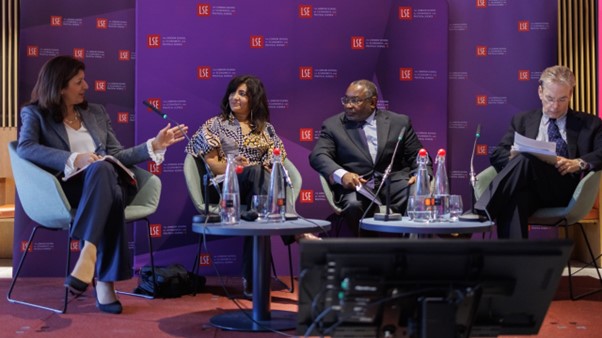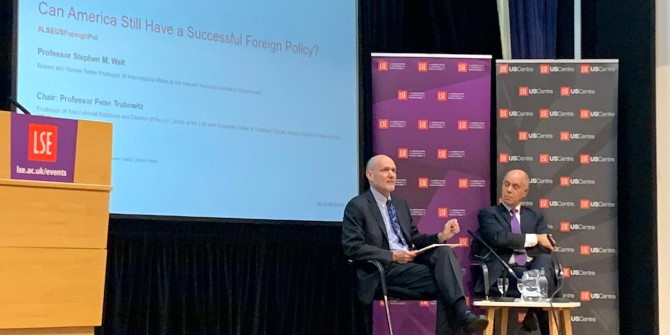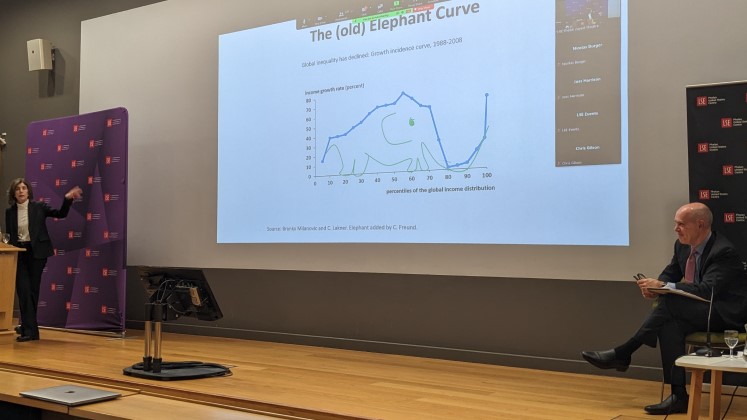 On Wednesday 9 November, the Phelan US Centre hosted the online public event ‘Sizing Up the US Midterm Elections’. Alexandra Smith reviews the key takeaways and insights of each of the speakers and topics covered in the event’s Q&A segment.
On Wednesday 9 November, the Phelan US Centre hosted the online public event ‘Sizing Up the US Midterm Elections’. Alexandra Smith reviews the key takeaways and insights of each of the speakers and topics covered in the event’s Q&A segment.
With the prospect of a ‘red wave’ and expectations for big electoral gains for the Republican Party, the US electorate headed to the polls on Tuesday, November 8 to vote for local, state, and federal offices. To understand the rather unexpected outcomes of the midterm election and the relative success of the Democratic Party, a panel chaired by Phelan US Centre Director Professor Peter Trubowitz brought together Professor Stephanie Rickard (LSE Government), Professor James Morrison (LSE International Relations), Joseph Sternberg (The Wall Street Journal), and Dr. Linda Yueh (Oxford University) for a lively discussion and debate.
Professor James Morrison framed his initial comments on the election on three themes: the economy, culture wars, and Trumpism. Morrison highlighted exit polling data which showed the relatively low impact of high inflation and economic downturn on people’s voting despite Republican’s attempts to push this as a key issue where the party is stronger policy wise than the Democrats. The strategy was unsuccessful, Professor Morrison argued, because of the strength of the US economy considering current global economic challenges. Instead, Morrison argued that cultural issues like abortion drove many to the polls to vote and polarized Democrats and Republicans more than purely economic issues. Finally, Professor Morrison pointed to the meagre success of Trump-endorsed Republicans in state races as indicative of a slowing MAGA movement.
Professor Rickard expressed surprise at the results noting how the orthodox logic of the past has been that when low approval ratings of the incumbent are paired with high inflation, the opposition party is almost always the beneficiary in a midterm election. Against this expectation, the Republicans did not make substantial gains in either the House or the Senate. The likely outcome, Professor Rickard noted, is a divided government wherein the executive is controlled by a different party than the legislature. While in the past, divided governments were seen as positive for the practice of checks and balances between institutions, the current political polarization will likely mean that gridlock will ultimately stall any legislative progress. Although the road ahead for effective governing will be difficult, Professor Rickard ultimately characterized this election as a win for democracy and governance in America.
Evaluating the performance of Republicans and Democrats, Joseph Sternberg outlined several key lessons each party should take away from the results. On the right, Republicans continue to be divided between Trump loyalists and more mainstream candidates. The weak showing for Trump-endorsed candidates should encourage mainstream candidates and party leaders to seek out and endorse candidates with more traditional platforms if they want to make substantial electoral gains in 2024. On the left, Sternberg emphasized just how lucky Democrats were to hold off the red wave that had been expected. Sternberg argued that the Democrats should look on this result with relief that the selection of weak Trump-endorsed candidates benefitted their party in key states like Pennsylvania. As for the implications this race will have on the future, he noted that Florida Governor Ron DeSantis continues to be a strong figure for the Republican Party and that Democrats will need to respond in kind with young politicians who can offer a future for the party if they want to win in 2024. On both sides, Sternberg advised that the parties focus more on platform and substance rather than on party personalities and partisan differences.
Closing out the panellists’ initial evaluations was Dr. Linda Yueh who highlighted exit polling that demonstrated that voters were more nuanced in this election in the issues which drove them to the polls and towards particular candidates. The conventional wisdom of the past has been that voters ultimately evaluate the midterms on their gains or losses over the past few years, asking themselves ‘Am I better off?’. While the economy was a key area in this election, the relative success of the US economy allowed voters to focus on other issues of concern like abortion and immigration. Dr. Yueh also underscored that the outcomes of the midterms and any subsequent run-offs are a kickoff to the 2024 general election with former President Trump expected to announce his candidacy in the coming weeks. While some election-deniers gained seats in Congress and state legislatures which remains an issue of concern, Dr Yueh highlighted the success of many younger and minority candidates as a particular bright spot in the midterms.
In summing up the midterm elections, all the panellists emphasized that this was a crucial moment in the US for strengthening democracy and boosting the legitimacy of the electoral process which has been through serous challenges over the past decades.
Answering questions from the audience, the panellists were asked about the role of education in voting patterns, the expectations on Biden’s agenda moving forward if a divided government is realized, and the implications the election will have on US support for the war in Ukraine.
- Featured image: Photo by Manny Becerra on Unsplash
- Listen to a podcast of the event [LSE Player]
- Note: This article gives the views of the author, and not the position of USAPP – American Politics and Policy, nor the London School of Economics.
- Shortened URL for this post: http://bit.ly/3tEgzWH






